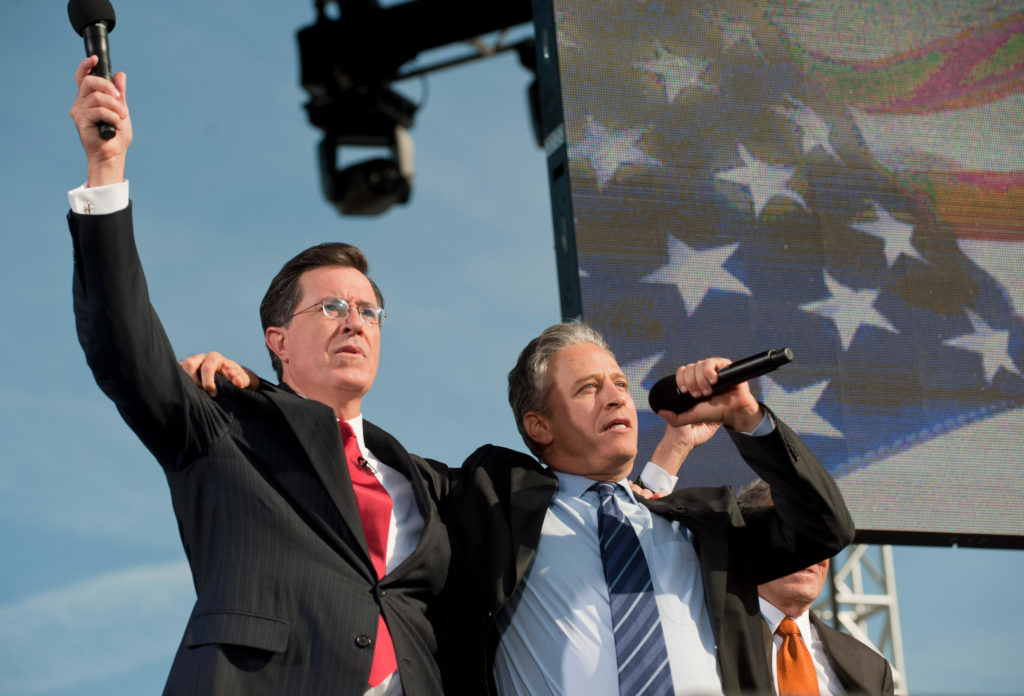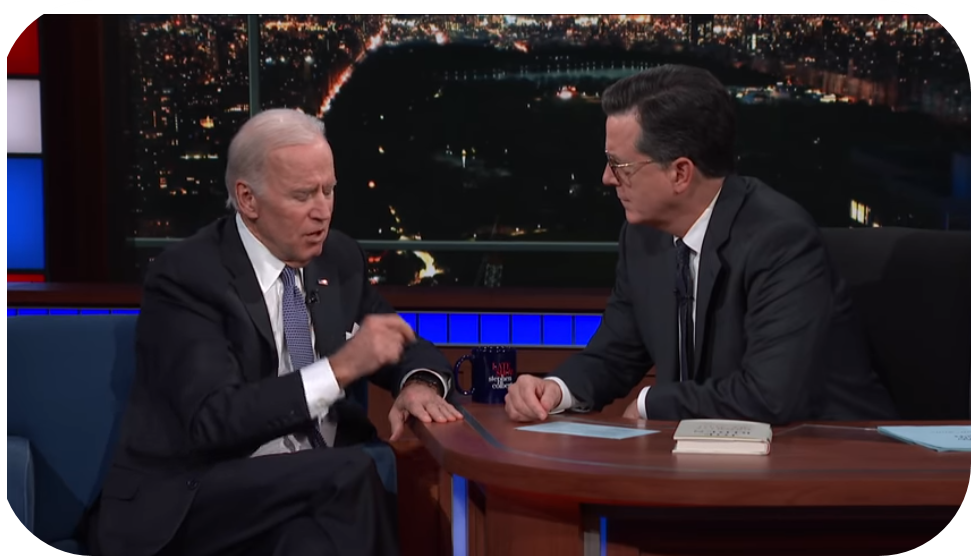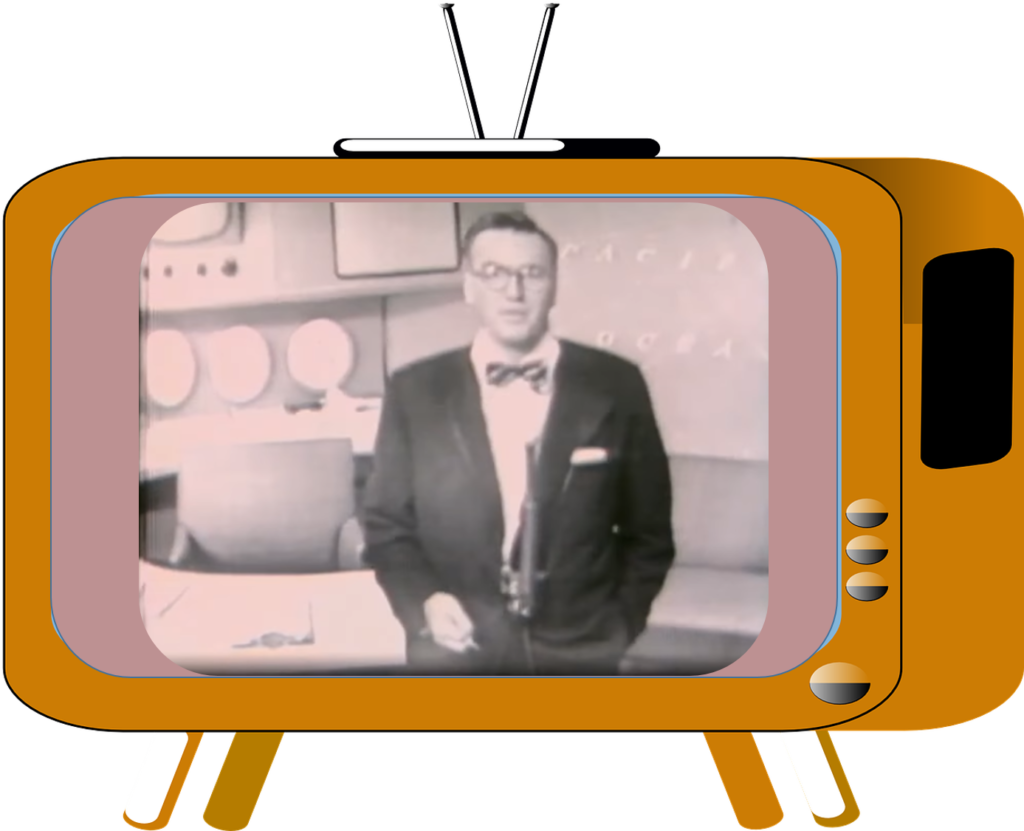
No one studies the art of doing great on-air radio than our Mike Stern. And like all great talent coaches, Mike spends considerable time looking for lessons and inspirations in other circles.
Lately, he’s been watching a lot of television. No question about it – there’s amazing content coming out of what was once derisively referred to as  “The Boob Tube.” These days, there’s a plethora of great content on our at-home video screens.
“The Boob Tube.” These days, there’s a plethora of great content on our at-home video screens.
And that’s especially true at night where the late night talk show format endures with more choice and variety than ever, despite the fact it’s been a TV staple since “Today” debuted this week in 1952 with host Dave Garroway.
The format didn’t exist so Garroway invented it. And decades later, TV humorist Stephen Colbert found himself with a similar challenge. In today’s post, Mike takes a look at Colbert’s struggles, and eventual discovery of a pathway to success. It’s a great primer for radio talent seeking to make the leap. – FJ
It’s never easy to take over for an icon. It’s even harder when you’re attempting a task you’ve technically never done before.
That’s the position Stephen Colbert was in when he took over the “The Late Show” in September of 2015, stepping into the role vacated by the legendary David Letterman. Despite having been a correspondent on Jon Stewart’s “The Daily Show,” and then hosting his own show, “The Colbert Report,” Colbert struggled when he took over the hosting reins on “The Late Show.”
Many radio personalities suffer the same degree of discomfort when they finally get that shot at morning drive. How do they transition from midday or afternoon drive? The question looms: whether to model their show after morning stars — like Steve Dahl, Elvis Duran or Kidd Kraddick – develop their own style, or some combination of both?
Colbert’s struggle to find himself on “The Late Show” came out in detail late last year. To extend his holiday vacation while still providing new content, Colbert pre-taped several shows where his friends took over behind the desk as guest host and proceeded to interview Colbert who moved over to the traditional guest chair.
The most fascinating of these “Flipped” role reversals occurred when his former boss and good friend, Jon Stewart, hosted the show and interviewed Colbert. And it turns out, it’s a great primer for radio personalities – especially those who move up into a better, more prominent daypart.
Here’s the 6-minute exchange, a great primer in taking over the reins and finding a way to make it work.
I’ve watched Stewart and Colbert talk this through a few times, and I’ve come away with seven important lessons that morning shows and go-to radio personalities can bring to their craft.
1. Adaptability – In the interview, Stewart probes Colbert about the transition to being a true late night host. As Stewart explains to his friend “I came up in standup where you learn to deliver it as yourself and as authentic as you can be to yourself is as good as you are going to be as a standup.”
But Colbert had a different background working as an actor and an improviser, “You always wore, even on The Daily Show, some sort of veneer of character or affect,” said Stewart. “What was it like to pull off all the character, all the facades and did you feel vulnerable?”
This is when Colbert started to share his experience about adjusting and adapting to being himself on the new show so many of which are directly applicable to being a radio host. And the fact is, it takes time.
We blogged about Colbert’s rough start which eventually led to the hiring of “Morning Joe” producer Chris Licht, a moment Colbert points to as part of the show’s turnaround – and his own transition to his new role.
2. Authenticity – Many personalities share this struggle: the art of being real. In Colbert’s case, he had always been a walking/talking character. He made his name by playing a role. All of a sudden, he had to own his persona – to play himself.
In the interview, Stewart asks him, “When you first came out here, the vulnerability you felt expressing opinions you knew people could peg directly to you. How hard was that?”
Colbert admits it was a huge challenge to share his opinions, “If I say it, it’s really me saying it. You don’t have the protection of the mask” – a dilemma he had trouble overcoming.
Colbert also realized that after years of playing characters, “I didn’t know who I was.” To keep himself centered on the show for a long time he had his wife sit in the audience where he could see her. To stay grounded he would remind himself, “I’m married to her. That’s who I am. I’m her husband.”
That process – going from being a character voice to being a real person – is a tough putt for any personality, whether on the late show on TV or on the radio in morning drive. But often it really is a turning point in starting to build a loyal audience as listeners or viewers bond with real people more than characters.
3. The breakthrough – It happens to most personalities – there is a bit, interview, event, or audience encounter that changes the game.
 For Colbert, it was an expansive, heartfelt interview with Joe Biden. “Only I, my real self, could have received what Mr. Biden was willing to share with the audience,” Colbert said.
For Colbert, it was an expansive, heartfelt interview with Joe Biden. “Only I, my real self, could have received what Mr. Biden was willing to share with the audience,” Colbert said.
Afterword, he turned to his producer and said “that nice old man just gave me my show because now I know that there are times when I absolutely have to be myself,” a feeling Colbert has embraced.
The Colbert-Biden interview has racked up more than 3 million views on YouTube, underscoring its entertainment value and resonance.
That’s the moment where you realize you’ve jumped to another level, that you’ve made a difference, and that you’ve created an indelible moment for the audience.
4. Embracing a benchmark – There’s a reason why so many shows all over the world do similar bits and features. The really good ones almost always work.

In late night television, it’s always been about opening the show with a monologue. Parr, Carson, Letterman, Leno, Fallon – they’ve all done it that way. And it’s something Colbert had never done before. His lack of standup skills was part of the problem, but the other involved overcoming his inclination that monologues are an old, tired idea lacking in innovation – that he had to find a novel way of starting “The Late Show.”
Great personalities, however, don’t always have to reinvent the wheel. They put their own imprimatur – their personal stamp – on benchmarks so they can own them.
Stewart advised Colbert to embrace the monologue, but for six months, “The Late Show” opened without one. When show runner and executive producer, Chris Licht, joined the show, he encouraged Colbert to focus what he was best at: topical humor – responding quickly to what just happened. That was the angle that defined Colbert’s version of the monologue.
With that suggestion Licht did the best thing a manager can do for a talent. He gave Colbert permission to be himself, “Do as many jokes on any subject you want, just do the thing you seem to like the most,” to which Colbert’s replied, “We’ll there’s a crazy idea.”
Colbert learned that rather than reinvent the late night concept, “I’ve discovered I can have so much fun doing an old form but with our flavor.”
5. Finding your niche – While mastering a great benchmark – like the monologue – was something Colbert had to wrestle with, it was also incumbent upon him to find his own content identity.
And it turned out the “live show” was it. The pressure of having to produce a live, in the moment, real-time show helped him find his unique persona on the show. These political times – ushered in by the Trump Era – signaled Colbert’s ability to seize the moment.
His next one is scheduled immediately following “The State of the Union” address by President Trump (assuming it happens, of course) on January 29, featuring former New Jersey Governor Chris Christie. The spontaneity of these shows provides Colbert a chance to show off his talent and humor under fire.
 6. Trust your staff – Whether it’s a producer like most morning shows have or a staff of writers like Colbert has at his disposal, it comes down to the same thing: developing faith in your support people.
6. Trust your staff – Whether it’s a producer like most morning shows have or a staff of writers like Colbert has at his disposal, it comes down to the same thing: developing faith in your support people.
As he grew into trusting Licht and the rest of his team Colbert leaned, “I didn’t have to steer the ship so tightly. They know the kind of comedy I like and that paid off in the show I’m doing now.”
7. Understanding bosses – Give credit to those fickle corner office denizens at CBS corporate, including much-maligned ex-boss Les Moonves. They stuck by Colbert during that initial rough ride when nothing seemed to work.
Whether you work for managers who “get it” or those who get trigger-happy at the first sign of shakiness, it’s often  something out of talent’s control. But it certainly is a contributing factor to any radio personality’s success.
something out of talent’s control. But it certainly is a contributing factor to any radio personality’s success.
The tendency to cut bait, try something else, institute a different system, or simply not give a new show enough time is a common managerial mistake. Talent’s ability to buy time is often the most important variable that contributes to success.
Not everyone can master the size and scope of the transition Colbert has pulled off on “The Late Show.” But if you think about it, some of radio’s most successful personalities – from Phil Hendrie to Bob Rivers to Tom Leykis to Ellen K. to Drew & Mike – had to mostly figure it out for themselves.
There’s inspiration in this 6-minute, honest exchange between two of TV’s best humorists and hosts. The biggest of which is, to be successful, it has to be you.
- Does Your Radio Station Need A Princess? - December 17, 2024
- With A Name Like Smucker’s… - December 10, 2024
- Kondo And Romo:The Pros And Cons Of Regression - February 10, 2023




Great piece. When I moved from years as a traditional air personality (calls first thing out of your mouth, be concise…) to a completely different approach where we talked about the music, didn’t come out of songs with the calls, etc, it was quite a learning curve. For example, songs ends: “Paul McCartney wrote it for his bandmate’s son. Paul knew Julian’s parents’ split was tough on him. ‘Hey Jude’ on 1077.7 The Lake….”
The boss said, “You have to know the rules in order to break them.” It took a while to get it but I eventually hit my stride and enjoyed the change.
These things take time, Tina. Thanks for sharing the story.
Excellent read today — Mike and Fred.
Thanks, David. Mike enjoyed writing it.